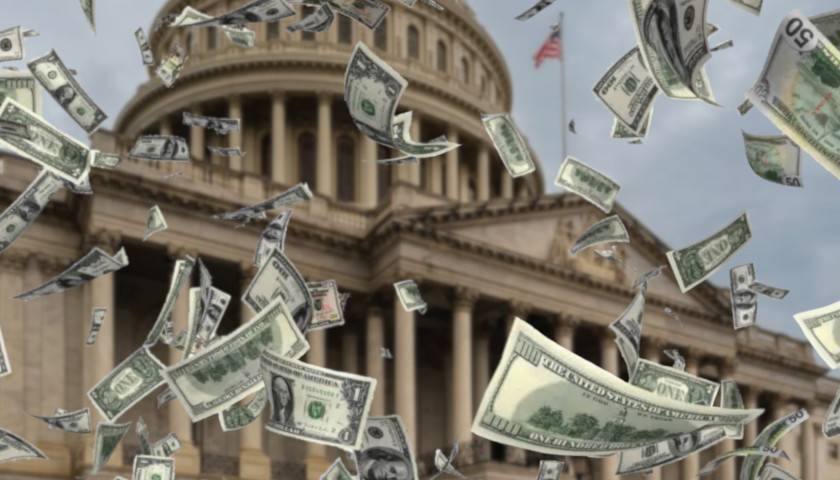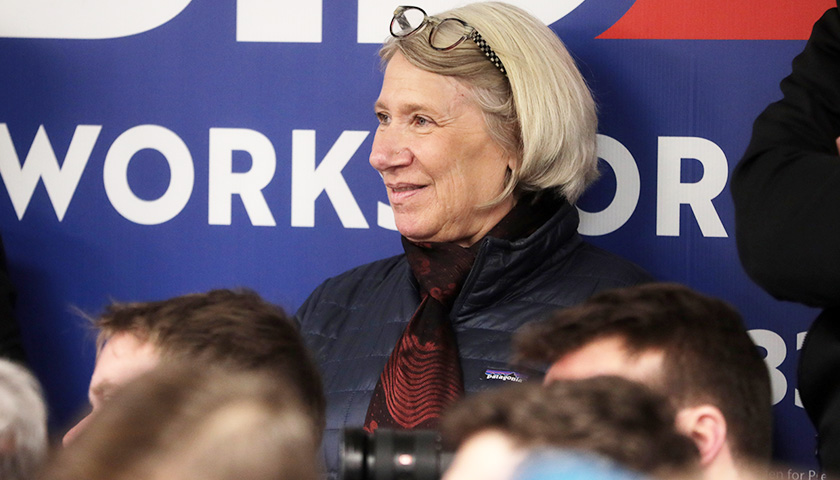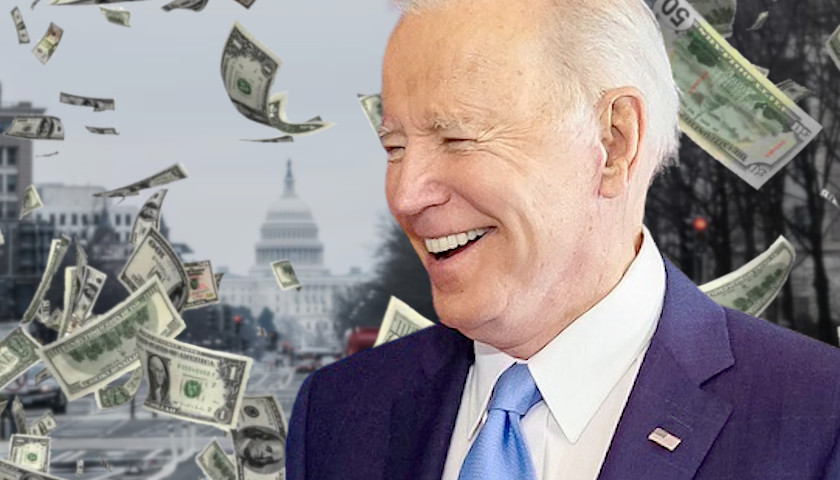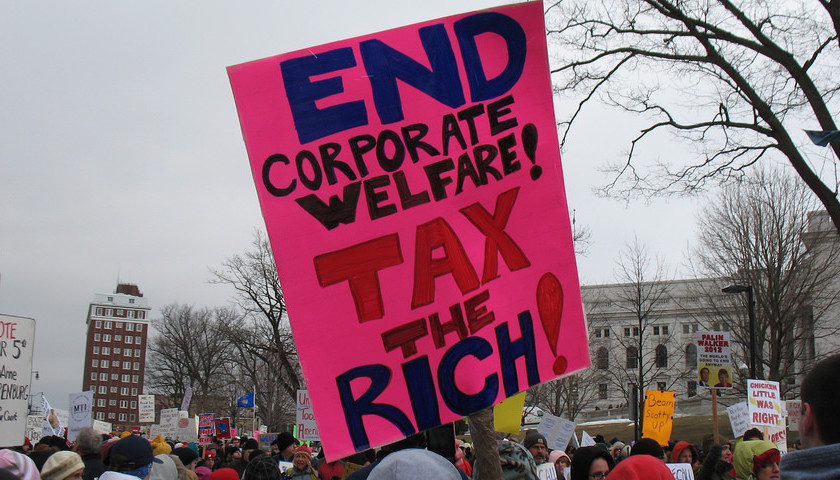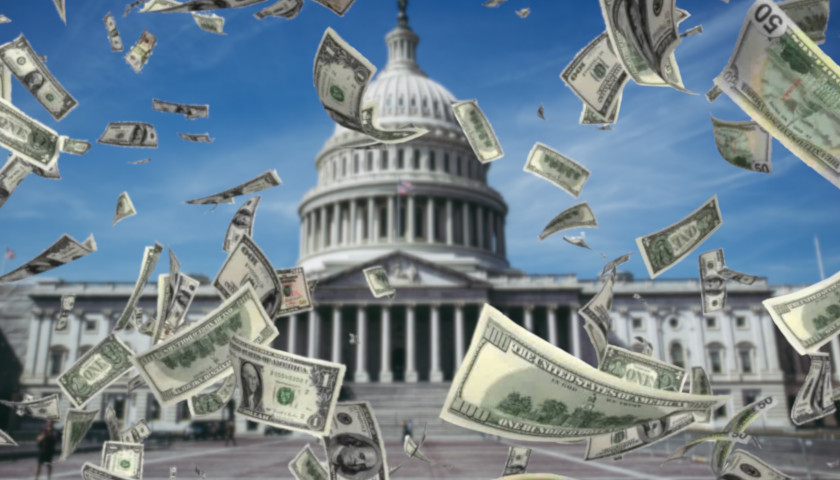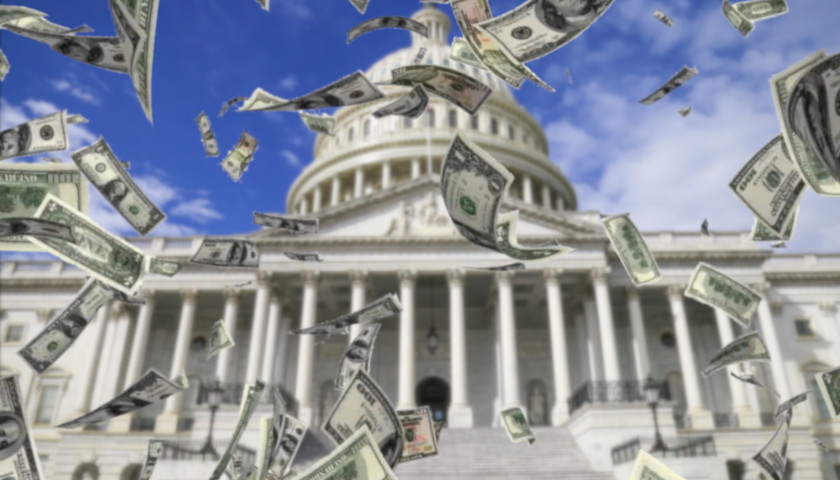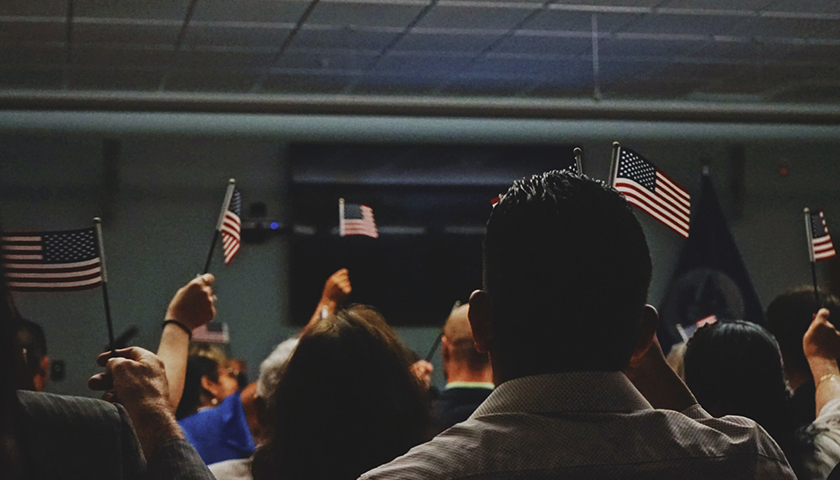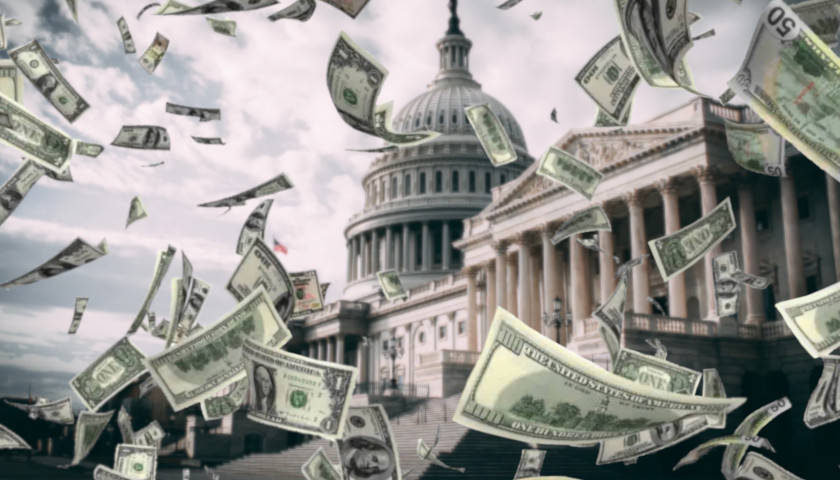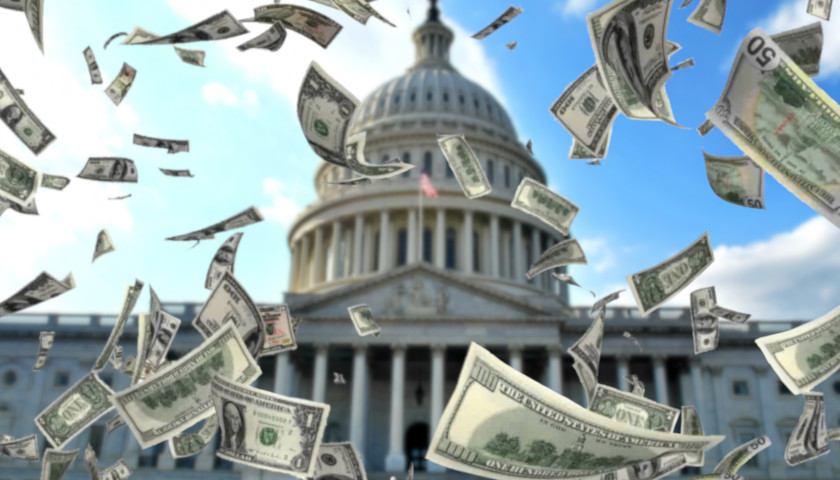House Speaker Mike Johnson on Sunday said Congressional leaders reached a topline spending deal to avert a federal government shutdown by providing funding through the rest of the fiscal year.
Read MoreTag: Government Spending
Commentary: Americans Turn on Globalists Saying Government Spending, Greed, and Global Issues Drive Inflation
A new survey reveals inflation is still the primary concern for Americans by a wide margin, and the public is beginning to turn on big government and recognize government spending and globalism as the culprits behind a dwindling standard of living.
This comes at a time when the country is poised to choose between another four years of excessive spending and an evaporating middle-class or return to an America First philosophy that strengthens the middle-class and structures international policy in our favor.
Read MoreNew Government Spending Will Benefit Top Biden Adviser’s Consulting Clients
White House Senior adviser Anita Dunn has consulted for companies and trade groups that have benefited or stand to benefit from federal funding and is being forced to recuse herself from matters involving them, according to a financial disclosure.
Dunn has consulted through the public affairs firm SKDK during the past two years for the likes of Pfizer, AT&T, Micron and the American Clean Power Association, according to a filing reported on by CNBC Friday. Dunn, who founded the SKDK in 2004, is recused from working on issues related to past clients, a spokesman for the White House told the Daily Caller News Foundation.
Read MoreConsumer Prices Rise 8.5 Percent, the Highest in 40 Years
Newly released federal inflation data show that prices continue to rise at the fastest rate in four decades, continuing the trend of soaring inflation.
The Bureau of Labor Statistics released its Consumer Price Index, a key indicator of inflation, which showed prices rose an additional 1.2% in March, part of an 8.5 percent spike in the past 12 months.
Read MoreBiden’s Budget Proposal Has Three Huge Red Flags, Experts Say
President Joe Biden’s recently unveiled budget includes massive tax hikes, untrammeled government spending and “leftist” agendas, raising serious red flags, experts told the Daily Caller News Foundation.
Read MoreCommentary: When Envy Trumps Economics
President Joe Biden has seized on a winning message: tax the rich. He tweets incessantly, “Big corporations and the super wealthy have to start paying their fair share of taxes. It’s long overdue,” and claims his Build Back Better agenda “will be paid for by the wealthy paying their fair share.”
Instead of highlighting the few benefits of his Build Back Better Act, (H.R. 5376) his public positioning is about harming a particular group. Why? This message sells with three key constituencies he’s counting on to pressure Congress to vote yes.
Younger millennials and Gen Z who believe the uber-rich should not exist.
The working rich who believe taxing themselves is a solution to poverty and a source of economic growth.
The governing elites who want to accumulate more government control by enlarging the dependent class.
Younger Millennials and Gen Z: Being Rich Is Inherently Bad
A recent PEW research poll revealed that half of adults under 30 believe billionaires are bad for the U.S. One self-proclaimed “anticapitalist” Millennial and trust fund beneficiary summed it up this way: “I want to build a world where someone like me, a young person who controls tens of millions of dollars, is impossible.” Accordingly, wealth comes from exploitation. Giving their money away (or giving it to Washington to redistribute into a social justice plan) is making “reparations.”
Using this logic, the late Steve Jobs should have been prohibited from earning ridiculous amounts of wealth. Because of his ingenuity, however, millions of jobs have been created, young people have been inspired, and some of the greatest technology has been made available. Like Jobs, those who earn their billions through innovation (and experience many failures in their pursuit and on their own dime) reinvest it in the economy in ways the government could not. Moreover, their earnings are a result of what others were willing to pay them.
Working Rich: We’re Moral People
A 2019 letter penned by more than a dozen of the wealthiest Americans — including George Soros, heiress Abigail Disney, and Molly Munger, daughter of Berkshire Hathaway Vice Chairman Charlie Munger— stated, “it is our duty to step up and support a wealth tax that taxes us.” They believe America “has a moral, ethical and economic responsibility to tax our wealth more.” Mr. Biden’s allies on the Left share this opinion.
A “transfer of wealth” by taxing the rich is nothing short of legal theft. Government is not, and cannot be, altruistic. Government has nothing to give that it has not taken from another by force. With few exceptions, this type of help will erode self-reliance and the moral incentive of charitable action, leading to more government spending.
Ignored is that the free market has done more to break the cycle of poverty than any government program, as it empowers people and mends the nonfinancial, relational parts of society.
The wealthy could put their money to better use by directly donating to effective charitable causes, investing in local communities, or investing in expanding their businesses to serve more consumers and create more jobs. Moreover, there is nothing stopping billionaires from giving their wealth directly to the U.S. government. If they genuinely believe it is their “moral, ethical and economic responsibility,” there is no need to wait.
Governing Elites: We Like Being In Control
They say it’s about social or economic justice, but President Biden’s messaging is déjà vu from Obama-era calls to redistribute wealth, or Marxist accolades of redistribution as a form of economic justice. The increasing popularity of taxing the rich makes the job of government elites easier. President Biden even engages in shame-tweeting such as, “Those at the top have been getting a free ride at the expense of the middle class for far too long.” But the bureaucrats’ real reason to tax the rich is to snatch individuals’ birthrights of personal responsibility, a move toward a centralized system that deflates personal choices and violates personal rights.
Taken together, these ideas unfortunately resonate beyond younger millennials and Gen Z, the working rich, and the governing elites. Jumping onto the “tax the rich” bandwagon feels good because – why should the rich have that much money anyway?
Envy permeates this ideology. Yet economics trumps envy.
The actual tax burden will not fall on folks writing checks to the US Treasury. The rich will, for the most part, still be rich. It’s the middle- and working class who will pay dearly when high-income individuals respond to the tax hike by simply investing less, resulting in fewer job opportunities and lower wages.
Left to fend for their economic lives will be small-business owners. President Biden may consider them wealthy, but taxing these individuals more will decimate communities, as jobs are lost or not created, and wages and hours are cut.
There’s no question that taxing the rich is popular. Problem is, it’s also reckless.
Instead of highlighting the few benefits of his Build Back Better Act, (H.R. 5376) his public positioning is about harming a particular group. Why? This message sells with three key constituencies he’s counting on to pressure Congress to vote yes.
Younger millennials and Gen Z who believe the uber-rich should not exist.
The working rich who believe taxing themselves is a solution to poverty and a source of economic growth.
The governing elites who want to accumulate more government control by enlarging the dependent class.
‘Hard to Know Where Pandemic Relief Money Went,’ Admits Federal Spending Watchdog
This week’s Golden Horseshoe goes to a broad sweep of federal agencies for a systemic lack of transparency that is hampering efforts to monitor many billions of dollars in COVID-19 relief spending, according to a report by the Pandemic Response Accountability Committee.
The PRAC was established in 2020 by the Coronavirus Aid, Relief, and Economic Security (CARES) Act to “promote transparency and conduct and support oversight” of more than $5 trillion in pandemic relief funds.
In a report released Wednesday, the watchdog details its difficulty in determining how funds are being spent due to federal agencies’ poor reporting on the government spending website, USAspending.gov.
Read MoreSenate Fails to Wrap Up Infrastructure Bill After Talks to Expedite Process Collapse
Senate Majority Leader Chuck Schumer set up a critical vote on the bipartisan infrastructure bill Saturday after talks to expedite the process fell apart late Thursday.
Both Republicans and Democrats engaged in marathon talks Thursday in a bid to vote on a package of amendments and to advance the sweeping public works package. Doing so, however, required approval from all 100 senators, and Tennessee Republican Sen. Bill Haggerty refused to go along even as his Republican colleagues urged him to do so.
In a statement, Hagerty attributed his objection to the Congressional Budget Office’s estimation that the bill would add $256 billion to the national debt over 10 years.
Read MoreU.S. Set to Hit Debt Ceiling Within Four Months, Congressional Budget Office Estimates
The federal government is on track to reach the statutory debt limit in the fall, which would trigger a government shutdown, according to a Congressional Budget Office (CBO) estimate.
The U.S. is projected to reach the debt ceiling of $28.5 trillion by October or November, a CBO report released Wednesday stated. If Capitol Hill lawmakers don’t reach an agreement on raising the limit higher, the government could undergo its third shutdown in less than four years.
“If the debt limit remained unchanged, the ability to borrow using those measures would ultimately be exhausted, and the Treasury would probably run out of cash sometime in the first quarter of the next fiscal year (which begins on October 1, 2021), most likely in October or November,” the CBO report said.
Read MoreCommentary: Inflation Has Arrived
Wildly excessive federal spending is causing major inflation and shortages, which may lead to a recession and perhaps a financial crisis. Despite the evidence of inflation, Congress is proposing to spend $3.5 trillion on top of the $1.9 trillion COVID relief bill passed earlier this year and the intended $1.2 trillion infrastructure bill. For comparison, federal revenue is only expected to be $3.8 trillion this year.
Evidently, the Democratic Party and President Joe Biden have adopted Modern Monetary Theory (MMT) to the peril of every American citizen. MMT, which is similar to Keynesian economics, says that the U.S. should not be constrained by revenues in federal government spending since the government is the monopoly issuer of the U.S. dollar. MMT is a destructive myth that provides cover for excessive government spending. And it’s not modern, since reckless government spending has been around for thousands of years.
Embracing MMT is similar to providing whiskey and car keys to teenage boys. We know the outcomes will not be good.
Read MoreCommentary: Two Studies on Immigration and Race, with Surprising Details
Two mainstream think tanks have published new studies on immigration and race in America that come to the typical, safe conclusions. But a look at the data inside shows something more interesting.
A new Cato Institute report defending immigration begins by contending that immigrants are unlikely to negatively affect states’ fiscal health. But within the study’s findings, Cato may have inadvertently provided a new reason to oppose immigration.
Using state budgets as a proxy for the quality of economic institutions from 1970-2010, the authors of the Cato study assert that “a larger share of immigrants at the state level is correlated with slower state revenue and spending growth in the short-term, measured by total per capita government revenue and expenditure growth.” In other words, the more immigrants there are in a state, the less the state tends to take in in taxes and the less it spends on services. This is hardly groundbreaking; we have always known that immigration is linked to welfare chauvinism.
Read MoreCommentary: Biden’s $2 Trillion Infrastructure Plan is Loaded with Corporate Welfare
President Biden has just unveiled a new $2.3 trillion “infrastructure” plan, but a shockingly large portion of this bill is actually unrelated to infrastructure.
The plan includes massive subsidies for corporations as well as state and local governments, and comes right after the administration’s proposed increase in the corporate tax rate, which would raise the rate from 21 percent to 28 percent.
There’s $300 billion for manufacturing, $100 billion for electric utilities, $100 billion for broadband, $174 billion for electric vehicles, and a whole lot more. A significant portion of this spending is directed at subsidizing big corporations.
Read MoreCommentary: PolitiFact Says 90 Percent of Biden Stimulus Spending Not Directly Related to COVID-19
President Biden’s $1.9 trillion “American Rescue Plan” could soon become law.
The budget-busting legislation, sold as emergency COVID response and “stimulus,” passed the Senate over the weekend. But even the liberal-leaning fact-checking website PolitiFact is pointing out that almost all of the bill’s spending is unrelated to the health effects of COVID-19.
“Total spending directly on COVID-19’s health impacts ranges from $100 billion to $160 billion,” fact-checker Jon Greenberg writes. “At the high end, direct COVID-19 spending represents about 8.5% of the bill’s $1.9 trillion cost.”
Read MorePaul’s Annual Report Details More Than $54B in Wasteful Federal Government Spending
Congress “spent as never before, doing so ostensibly without a care” in 2020, greatly contributing to what is now a $3.1 trillion deficit, Sen. Rand Paul, R-Kentucky, argues in his annual wasteful spending report.
At the same time, initial 15-day lockdowns to stop the spread of the coronavirus turned into nearly year-long lockdowns, Paul said, “wreaking havoc on Americans’ health, sanity, and economy, while also empowering petty tyrants across the country.”
Read MoreCommentary: Nine Wasteful Programs from Massive Spending Bill That Can, and Should, Be Reversed
President Donald Trump is right: There’s a lot of ridiculous gimmicks and wasteful projects in the new massive spending bill.
And the good news is there’s something that Trump can do about it, even though he recently signed the huge COVID-19 stimulus and omnibus spending bill into law.
Read More

